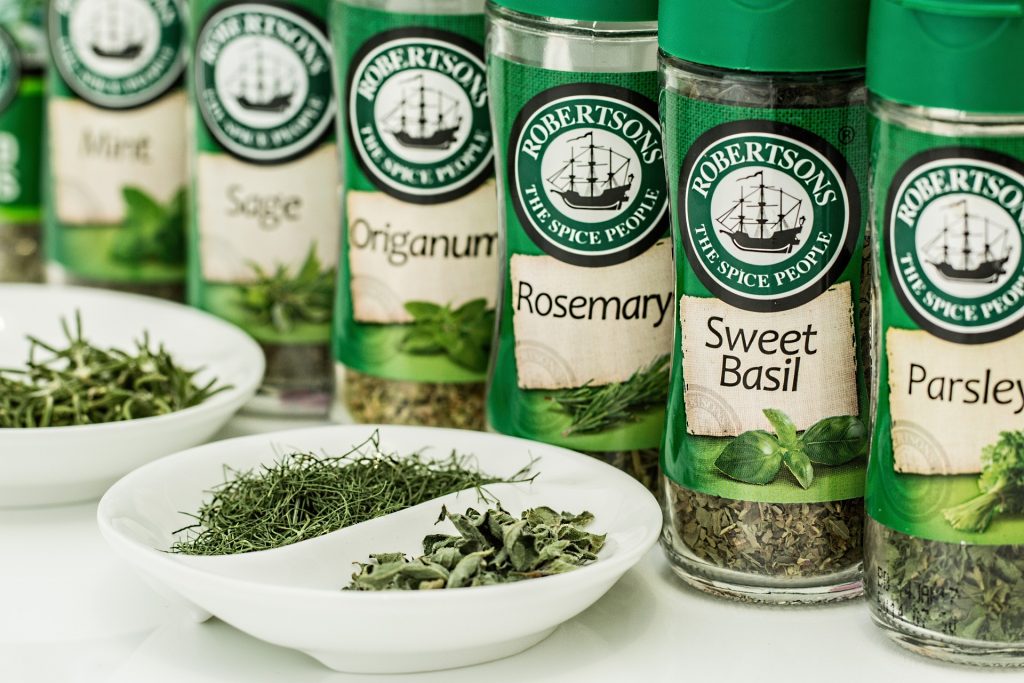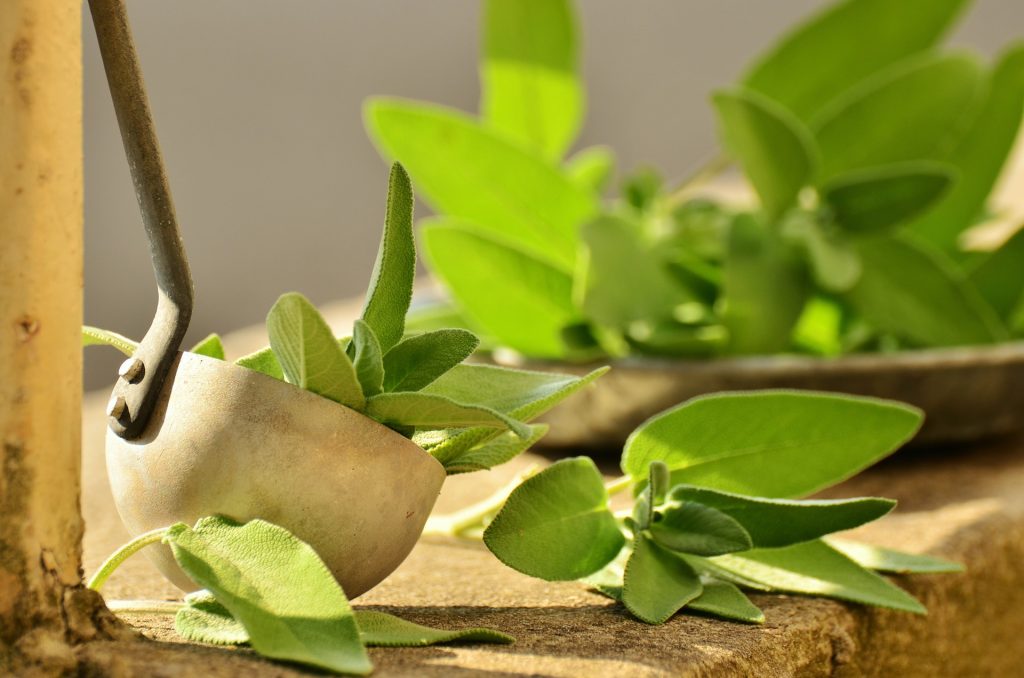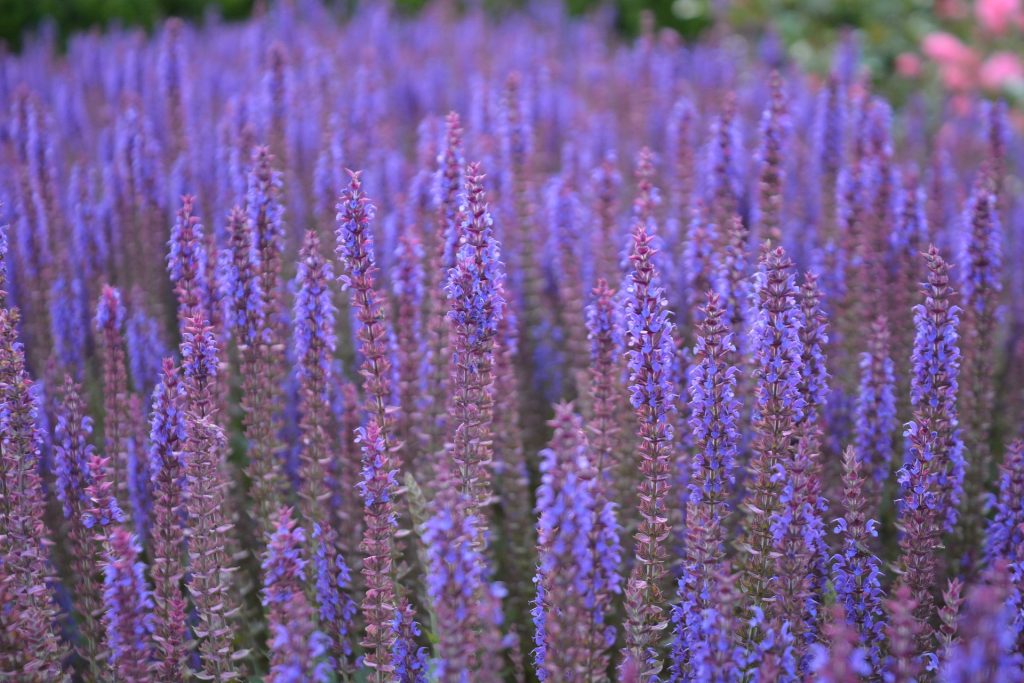 Salvia (sage) plants are a perennial plant that belongs to the Lamiaceae or mint family of plants. The most well known of these plants is possibly Salvia officinalis, which is also called common sage or garden sage. Salvia plants tend to grow to about 1 meter in height and possesses hairy leaves and a long stem that often possesses purple or lavender flowers. Salvia plants have a widespread distribution being found in both tropical and temperate region, and are often grown in gardens. Many of the plants in this group are aromatic. The aromatic nature of this group of plants comes from the presence of an essential oil in the plant tissues. These plants are often used in cooking because of their distinctive taste properties. Salvia species of plants have been used for a number of medicinal effects, For example, the aerial parts of Salvia officinalis is used as a blood sugar lowering agent, Salvia sclare is used as a tonic, Salvia macrosiphon is used as an antimicrobial and Salvia aegyptica is used as an anti-inflammatory.
Salvia (sage) plants are a perennial plant that belongs to the Lamiaceae or mint family of plants. The most well known of these plants is possibly Salvia officinalis, which is also called common sage or garden sage. Salvia plants tend to grow to about 1 meter in height and possesses hairy leaves and a long stem that often possesses purple or lavender flowers. Salvia plants have a widespread distribution being found in both tropical and temperate region, and are often grown in gardens. Many of the plants in this group are aromatic. The aromatic nature of this group of plants comes from the presence of an essential oil in the plant tissues. These plants are often used in cooking because of their distinctive taste properties. Salvia species of plants have been used for a number of medicinal effects, For example, the aerial parts of Salvia officinalis is used as a blood sugar lowering agent, Salvia sclare is used as a tonic, Salvia macrosiphon is used as an antimicrobial and Salvia aegyptica is used as an anti-inflammatory.

Salvia miltiorrhiza, also called red sage, Chinese sage, Tan shen or danshen, is another salvia plant that may have medicinal properties. Analysis of Salvia miltiorrhiza revealed that it contains a large number of phytochemicals that may explain its pharmacological activity. The phytochemicals present in Salvia miltiorrhiza include the phenolic acids protocatechuic acid, ptotocatechuic aldehyde, caffeic acid, isoferulic acid and Danshensu (3,4- diydroxyphenyllactic acid). There are also a number of polyphenols that are mainly conjugates of the phenolic acid, danshensu or caffeic acid. Other polyphenolic acids are rosmarinic acid, lithospermic acid and salvianolic acid A-G.
However, some of the salvia plants may have beneficial effects in the treatment of anxiety. For example, in one study, the neurochemical effects of lilac sage (Salvia reuterina, also called whorled clary) was investigated using animal models. Administration of lilac sage resulted in significant reductions in the anxious behaviour exhibited by mice when they were exposed to experimental stress. In addition, mice administered lilac sage also displayed significant reduction in movement, suggesting that the herb was an effective sedative. The mood elevating effects of Salvia has also been investigated in humans. In one study, human subjects were administered essential oil extract from Salvia lavandulaefolia. The results of the study showed that at 50 μL dose, the essential oil significantly improved the memory of the subjects. The same researchers also showed improvements in memory with 25 and 50 μL doses of Salvia officinalis and improvements in alertness, calness and centrentedness in the 50 μL dose group.

Analysis of Salvia reterana showed that the volatile constituents of the plant included 21 components in the essential oil including β-ocimene (32 %), α-gurjunene (14 %), germacrened (11 %) and hexyl acetate (8 %). Analysis of Salvia reterana showed that the volatile constituents of the plant included 31 components in the essential oil including β-caryophyllene (42 %), germacrene-B (21 %), caryophyllene oxide (7 %), cis-β-farnesene (6 %) and germacrene-D (6 %). Garden or common sage (salvia officinalis) (pictured) may have similar phytochemical constituents.
In another study, the effects of Salvia officinalis (garden sage or common sage) were investigated on the mood, anxiety and under-stress performance of healthy young subjects. Subjects were administered 300 or 600 mg of sage leaf and their mood was then evaluated on the Bond-Lader mood scale and the State Trait Anxiety Inventory. At both doses, administration of salvia officinalis led to improvements in mood. At the lower dose the herb was effective at reducing anxiety and at higher doses increasing alertness, calmness and contentedness. However administration of stress to the subjects did modify these effects, as might be expected. The researchers showed that the sage leaf extracts were able to inhibit acetylcholinesterase in the tissue cultures. This suggests that one of the mechanisms by which sage may work is through the inhibition of the enzyme that breaks down acetylcholine. This may increase acetylcholine levels in the brain, producing elevations in mood and memory.

Extracts of sage may inhibit the enzyme acetylcholinesterase and in doing so, increase brain levels of the neurotransmitter acetylcholine. This may then in turn increase memory and mood. In one study, a single dose 50 μL of salvia lavandulaefolia essential oil was administered to healthy participants. Oral consumption of the essential oil of Salvia lavandulaefolia was effective at improving memory and attention in the subjects, notably at 1 hour post consumption. In contrast improved alertness and reduced mental fatigue were more pronounced at 4 hours post consumption. This essential oil was made up almost exclusively of monoterpenoids. It was confirmed using tissue studies, that the essential oil was a potent inhibitor of acetylcholinesterase. Therefore the monoterpenes in the essential oil of Salvia lavandulaefolia may be partly responsible for the memory and mood elevating effects of the herb.
Eat Well, Stay Healthy, Protect Yourself
RdB
